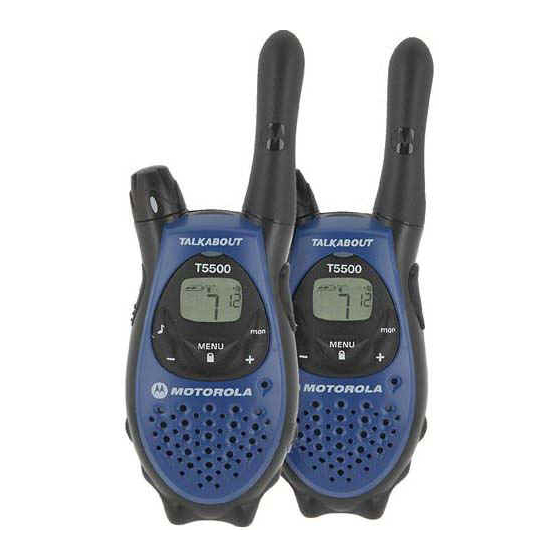Motorola TALKABOUT T5500 Communicatiehandleiding - Pagina 7
Blader online of download pdf Communicatiehandleiding voor {categorie_naam} Motorola TALKABOUT T5500. Motorola TALKABOUT T5500 16 pagina's. Frs/gmrs recreational two-way radios
Ook voor Motorola TALKABOUT T5500: Gebruikershandleiding (36 pagina's), Gebruikershandleiding (17 pagina's), Gebruikershandleiding (5 pagina's)

The "Monitor" or "Moni" button
The squelch circuit may keep the sound (audio) turned off if only a weak signal is being
received. So if you want to check to see if there is someone calling you with a weak
signal or if your are receiving a weak signal that is cutting in and out, press the Monitor
(Moni) button to temporarily turn off the squelch circuit. Also, if you do use a Privacy
Code always check to see that a channel is not already in use by holding down the Moni
button for a few seconds before you first transmission.
8) Locking the keypad settings
It is easy to accidentally push a button and mess up all your carefully made settings. To
avoid that, most radios have a lock mode. Usually you have to push Menu/Mode/Select
button, hold it down for several seconds and then a beep sounds plus a small padlock icon
appears on your LCD screen. Then you cannot change the settings unless it is
unlocked. To unlock it push and hold the Menu/Mode/Select button again until it beeps
and the padlock icon goes away.
9) "Ring Alert" or "Call Key"
The Ring Alert or Call Key
The ring alert or call keys send out a ring tone (often several are available) to make the
person receiving the tone notice that they are being called and reply. For some it is
annoying and we usually turn them off for disaster work.
RADIO REGULATIONS
1)
The Federal Communications Commission or "FCC"
The Federal Communications Commission (FCC) is an independent United States
government agency, created, directed, and empowered by Congressional statute. It is
charged with regulating all non-Federal Government use of the radio spectrum
including radio and television broadcasting and all US telecommunications. Some
understanding of the role of the FCC is important to CERT communicators because
of its role in regulation, licensing, monitoring, and enforcement of radio laws and
regulations. This section will explain the important rules governing the FRS and
FRS/GMRS radios that you need to know.
2) The FRS, GMRS and the Amateur Radio Service
In this manual we will deal with three FCC created radio communications "Services"
which are: the Family Radio Service or "FRS", the General Mobile Radio Service or
"GMRS" and the Amateur Radio Service ("ham radio service"). In summary:
An FRS radio is all you need for CERT activities. It requires no license and is
allocated 14 UHF* channels. The radios with only FRS are small. They put out no
more than ½ watt, and cost about ~$15-30
For disaster communication in the ASNC area, tune to FRS Channel 2 (Alternate: Ch 12)
Ham Radio Operators should also tune to Battalion 2 simplex 145.585 MHz, PL 110.9
7
